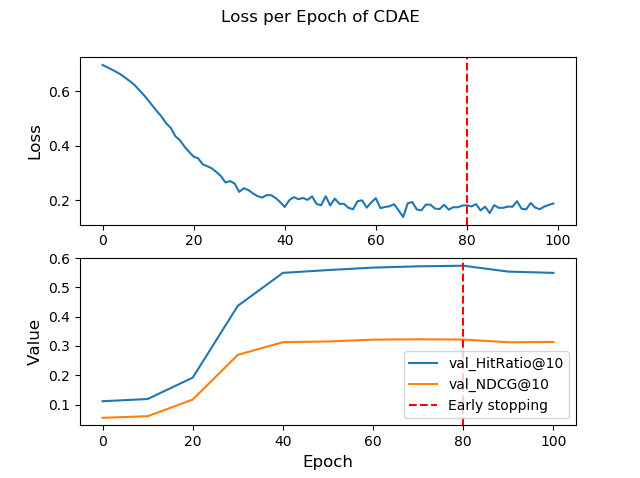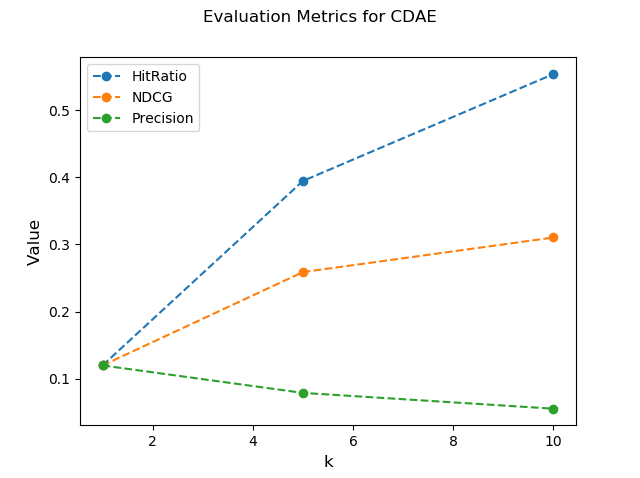Description Deep Recommenders with Python: A Python framework for building Deep Learning based Recommender Systems
Project description
DRecPy
Table of Contents
- Introduction
- Installation
- Getting Started
- Implemented Models
- Benchmarks
- License
- Contributors
- Development Status
Introduction
DRecPy is a Python framework that makes building deep learning based recommender systems easier, by making available various tools to develop and test new models.
The main key features DRecPy provides are listed bellow:
- Support for in-memory and out-of-memory data sets, by using an intermediary data structure called InteractionDataset.
- Auto Internal to raw id conversion (identifiers present on the provided data sets): so even if your data set contains identifiers that are not continuous integers, a mapping will be built automatically: if you're using an already built model you won't need to use internal ids; otherwise, if you're developing a model, you won't need to use raw ids.
- Well defined workflow for model building.
- Data set splitting techniques adjusted for the distinct nature of data sets dedicated for recommender systems.
- Sampling techniques for point based and list based models.
- Evaluation processes for predictive models, as well as for learn-to-rank models.
- Support for multi-column data sets, i.e. not being limited to (user, item, rating) triples.
- Automatic plot generation for loss values during model training, as well as test scores during model evaluation.
- All methods with stochastic factors receive a seed parameter, in order to allow result reproducibility.
For more information about the framework and its components, please visit the documentation page.
Installation
With pip:
$ pip install drecpy
If you can't get the latest version from PyPi:
$ pip install git+https://github.com/fabioiuri/DRecPy
Or directly by cloning the Git repo:
$ git clone https://github.com/fabioiuri/DRecPy
$ cd DRecPy
$ python setup.py install
Update Version
If you want to update to the newest DRecPy version, use:
$ pip install drecpy --upgrade
Getting Started
Here's an example script using one of the implemented recommenders (CDAE), to train, with a validation set, and evaluate its ranking performance on the MovieLens 100k data set.
from DRecPy.Recommender import CDAE
from DRecPy.Dataset import get_train_dataset
from DRecPy.Dataset import get_test_dataset
from DRecPy.Evaluation.Processes import ranking_evaluation
from DRecPy.Evaluation.Splits import leave_k_out
from DRecPy.Evaluation.Metrics import ndcg
from DRecPy.Evaluation.Metrics import hit_ratio
import time
ds_train = get_train_dataset('ml-100k')
ds_test = get_test_dataset('ml-100k')
ds_train, ds_val = leave_k_out(ds_train, k=1, min_user_interactions=10)
def epoch_callback_fn(model):
return {'val_' + metric: v for metric, v in
ranking_evaluation(model, ds_val, n_pos_interactions=1, n_neg_interactions=100,
generate_negative_pairs=True, k=10, verbose=False, seed=10,
metrics={'HR': (ndcg, {}), 'NDCG': (hit_ratio, {})}).items()}
start_train = time.time()
cdae = CDAE(hidden_factors=50, corruption_level=0.2, loss='bce', seed=10)
cdae.fit(ds_train, learning_rate=0.001, reg_rate=0.001, epochs=80, batch_size=64, neg_ratio=5,
epoch_callback_fn=epoch_callback_fn, epoch_callback_freq=20)
print("Training took", time.time() - start_train)
print(ranking_evaluation(cdae, ds_test, k=[1, 5, 10], novelty=True, n_pos_interactions=1,
n_neg_interactions=100, generate_negative_pairs=True, seed=10,
max_concurrent_threads=4, verbose=True))
Output:
[CDAE] Max. interaction value: 5
[CDAE] Min. interaction value: 0
[CDAE] Interaction threshold value: 0
[CDAE] Number of unique users: 943
[CDAE] Number of unique items: 1680
[CDAE] Number of training points: 89627
[CDAE] Sparsity level: approx. 94.3426%
[CDAE] Creating auxiliary structures...
[CDAE] Model fitted.
Training took 1620.2718272209167
{'P@1': 0.141, 'P@5': 0.0793, 'P@10': 0.0591, 'R@1': 0.141, 'R@5': 0.3966, 'R@10': 0.5907,
'HR@1': 0.141, 'HR@5': 0.3966, 'HR@10': 0.5907, 'NDCG@1': 0.141, 'NDCG@5': 0.2701, 'NDCG@10': 0.3327,
'RR@1': 0.141, 'RR@5': 0.2286, 'RR@10': 0.2543, 'AP@1': 0.141, 'AP@5': 0.2286, 'AP@10': 0.2543}
Generated Plots:
- Training
- Evaluation
More quick and easy examples are available here.
Implemented Models
| Recommender Type | Name |
|---|---|
| Learn-to-rank | CDAE (Collaborative Denoising Auto-Encoder) |
| Learn-to-rank | DMF (Deep Matrix Factorization) |
Implemented Baselines (non deep learning based)
| Recommender Type | Name |
|---|---|
| Predictive | User/Item KNN |
Benchmarks
TODO
License
Check LICENCE.md.
Contributors
This work was conducted under the supervision of Prof. Francisco M. Couto, and during the initial development phase the project was financially supported by a FCT research scholarship UID/CEC/00408/2019, under the research institution LASIGE, from the Faculty of Sciences, University of Lisbon.
Development Status
Project in pre-alpha stage.
Planned work:
- Wrap up missing documentation
- Implement more models
- Implement list-wise sampling strategy
- Refine and clean unit tests
If you have any bugs to report or update suggestions, you can use DRecPy's github issues page or email me directly to fabioiuri@live.com.
Project details
Download files
Download the file for your platform. If you're not sure which to choose, learn more about installing packages.
Source Distribution
Built Distribution
Filter files by name, interpreter, ABI, and platform.
If you're not sure about the file name format, learn more about wheel file names.
Copy a direct link to the current filters
File details
Details for the file DRecPy-0.0.3.tar.gz.
File metadata
- Download URL: DRecPy-0.0.3.tar.gz
- Upload date:
- Size: 45.0 kB
- Tags: Source
- Uploaded using Trusted Publishing? No
- Uploaded via: twine/1.13.0 pkginfo/1.5.0.1 requests/2.21.0 setuptools/41.0.1 requests-toolbelt/0.9.1 tqdm/4.31.1 CPython/3.6.8
File hashes
| Algorithm | Hash digest | |
|---|---|---|
| SHA256 |
fbd096878b2f10a58e497d66d8111de033adc06eb63f9d2969d3de4c38b01f33
|
|
| MD5 |
5591e51bbb5df51aae314adab76da50c
|
|
| BLAKE2b-256 |
21997567b170be4fbf239169807dbf481e1f16e9014d9da43f0c86361d967c86
|
File details
Details for the file DRecPy-0.0.3-py3-none-any.whl.
File metadata
- Download URL: DRecPy-0.0.3-py3-none-any.whl
- Upload date:
- Size: 63.6 kB
- Tags: Python 3
- Uploaded using Trusted Publishing? No
- Uploaded via: twine/1.13.0 pkginfo/1.5.0.1 requests/2.21.0 setuptools/41.0.1 requests-toolbelt/0.9.1 tqdm/4.31.1 CPython/3.6.8
File hashes
| Algorithm | Hash digest | |
|---|---|---|
| SHA256 |
845bb8c80d95dacd505e3105adce9dfdbf0ab88772e5ced881a9a018cf83a4c6
|
|
| MD5 |
4c9d0f797d759bc998f4c1be948291a8
|
|
| BLAKE2b-256 |
40e2a7ca799d7e0d63d9d9334a16187da342351bc41683bae73505b020a19a1c
|

















